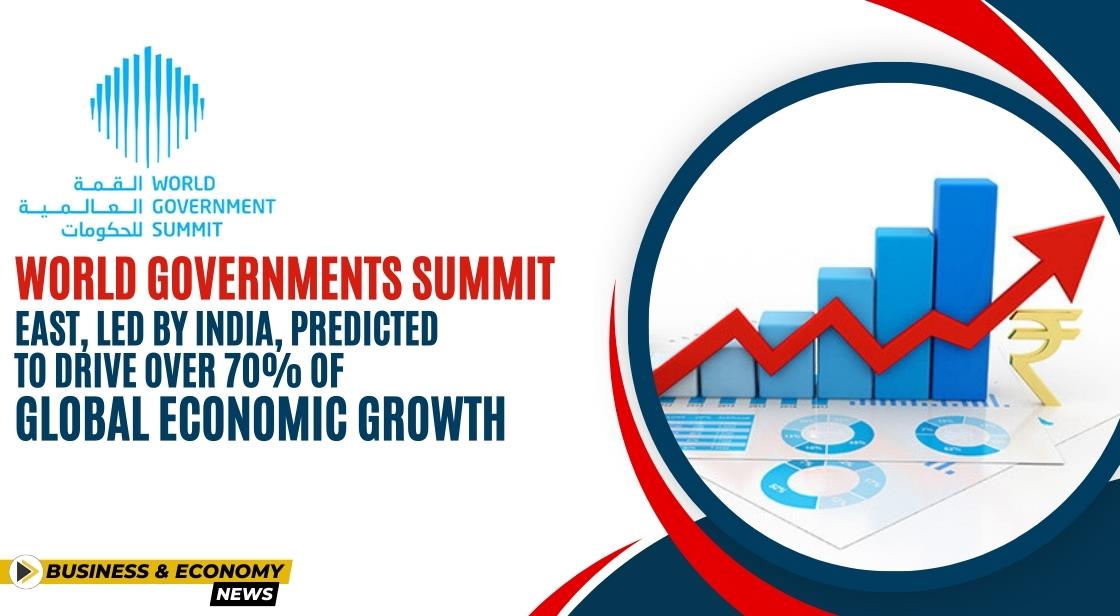World Governments Summit: East, Led by India, Predicted to Drive Over 70% of Global Economic Growth

News Synopsis
The World Governments Summit kicked off in Dubai, featuring India, Qatar, and Türkiye as guests of honor, underlining their global significance. Mohammad Abdullah Al Gergawi, UAE's Minister of Cabinet Affairs and Chairman of the Summit, emphasized the East's pivotal role in steering over 70% of anticipated global economic growth, with India and China leading the charge.
The imperative of collaboration and innovation took center stage to harness this potential for collective global advancement.
The World Governments Summit's Focus: Advancements and Alternatives
The summit delved into critical global issues, including advancements in artificial intelligence, soaring expenditures on global conflicts, and the urgency for transformative actions across various sectors.
Al Gergawi proposed alternatives to the staggering $17 billion spent annually on conflicts, suggesting redirected investments in education, health, and addressing challenges like hunger and illiteracy. He outlined four pillars for global change, emphasizing conflict resolution, economic evolution, technological advancement, and globalization.
Insights from Klaus Schwab: Shaping the Future
Klaus Schwab, Founder of the World Economic Forum, provided insights into the transformative impact of the Fourth Industrial Revolution. He advocated for technology's role as a key partner in shaping a future where individuals can unlock their full potential.
Schwab underscored the significance of personalized education and healthcare systems, combined with artificial intelligence and robotics, fostering creative problem-solving and community-building.
Collaborative Deliberations for Global Prosperity
As discussions unfolded, leaders from diverse sectors and nations engaged in collaborative deliberations aimed at setting new priorities and unlocking opportunities for global prosperity and peace. The summit served as a platform for forging common ground and finding solutions to shared challenges. Leaders aimed to pave the way for a brighter future for humanity through collaboration and collective action.
Beyond the Numbers: Pressing Issues and Solutions
-
Focus on:
-
Artificial intelligence advancements and their impact on various sectors.
-
The staggering $17 billion annual cost of global conflicts, prompting calls for investment in education, health, and tackling global challenges like hunger and illiteracy.
-
-
Critical pillars for global change:
-
Conflict resolution
-
Economic evolution
-
Technological advancement
-
Globalization
-
Shaping the Future with Technology and Collaboration
-
Klaus Schwab, Founder of the World Economic Forum, highlighted the transformative power of the Fourth Industrial Revolution.
-
Technology as a partner: Schwab advocated for AI and robotics alongside personalized education and healthcare systems to foster creative problem-solving and community building.
Toward a Brighter Future: Collaboration is Key
-
Leaders from diverse sectors and nations engaged in discussions and collaborations to unlock opportunities for global prosperity and peace.
-
-
A platform for collective action and forging common ground.
-
Aimed to pave the way for a brighter future through collaboration and solutions to shared challenges.
-
Conclusion: A Platform for Collective Action
The World Governments Summit emerged as a crucial platform for global leaders, with a focus on collective action to address common challenges. Through collaboration, innovation, and shared insights, leaders worked towards unlocking the vast potential of the East, particularly driven by India, for the advancement of global prosperity and peace.









